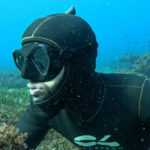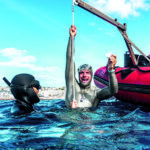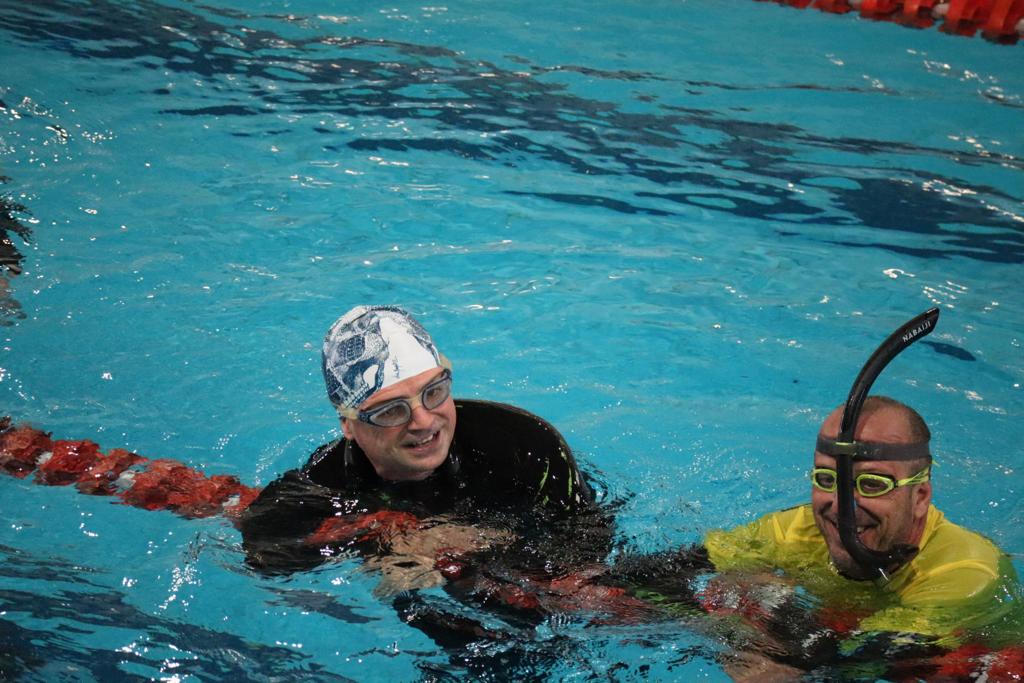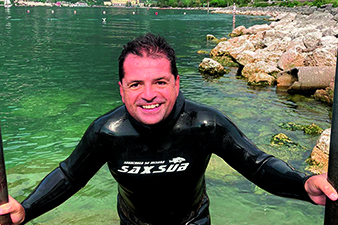Carlo Altomonte: coach and professor

C4: Condor Mask
20 March 2024
Ocean Freediving Lanzarote
24 April 2024In the swimming pool, he is considered one of the best in Italy and holds a chair in economics at Bocconi. The athletes he considers as references and the future projects
Filippo Carletti
"Professor of economics at Bocconi during the day and professional freediver at night." This is the description of Carlo Altomonte that we read on the website of ASD Sottopressione in Milan. Altomonte is also (for us, especially) one of the best coaches in Italy. So much so that at Aquamore Milano Bocconi Sport Center, it is said that if you talk about freediving, he's definitely involved.
Hello Carlo, how did the love for freediving arise, and how does it fit into your life as a teacher?
"I am originally from Calabria, so I had time and opportunity to experience my love for the sea. It could almost be said that I started swimming even before walking. Even today, living in Milan, I love spending my holidays by the sea. It's a passion I never gave up. Right here, I started attending a scuba diving course with my wife Silvia, a mountain lover, and then, about 10 years ago, a freediving course. Today we have mutually transmitted our respective passions. From there, it has been a continuous discovery: the first-level Apnea Academy course, training, and subsequent levels. We can say that we have experienced a complete journey, going through courses, then competitions, then becoming instructors, me federal and she Apnea Academy, and finally both coaches. We also earned a place as Elite athletes, even though she is much stronger than me! This evolution has always been driven by curiosity about the new and the desire to delve into certain phenomena and mechanisms, given that there are still many research questions to verify in a world, that of freediving, which remains partly unknown. So, I would say that asking questions, studying, trying to understand, and then disseminating is a path that combines the figure of the teacher with my approach to freediving. Moreover, in recent years, the team I coach, Sottopressione ASD, has grown a lot, so I have put aside a bit the life of a competitive athlete to focus more on the role of a coach. All this takes time, but as I always say: if I don't dedicate these hours to freediving, then I have to dedicate them to a psychotherapist, so better this way".
As an economist and freediver, I ask you: can one live solely on freediving?
“A few years ago, I would have said no: except for some exceptions, you could not live on freediving, or at least not in Italy. The exceptions I refer to are obviously Umberto Pelizzari, and other reference figures in the movement, such as Federico Mana, with whom I am collaborating. Of course, some great champions like Alessia Zecchini and Vincenzo Ferri, both professionals (by the way, this year I am again following Vincenzo for the indoor training part), also make exceptions. Today, however, we are experiencing a period of growth in our sport. In fact, freediving increasingly identifies itself as a discipline linked to a lifestyle deeply connected to the environment and the management of emotions, all issues currently very present even in purely work-related areas. To conclude, both because freediving is growing as a sport and because of the possibility of extending its practice to other areas, perhaps it is possible to make a living from this. Provided you are skilled, professional, and creative. And Milan from this point of view is the ideal place, even if there is no sea, because you can meet interested people, professionally stimulated and with the availability of spending for certain training paths".
As a coach and frequent visitor to swimming pools, are you aware that many do not have a club or train alone for various reasons? What can you tell me about this?
"It's a bit like when you played soccer as a child. As long as what you like is playing with friends, you can continue with do-it-yourself. If useful to catch your fish, there is nothing wrong with it, of course, once the basic notions of safety have been acquired because in the pool (and especially in the sea), the rule of 'never alone' should always apply. However, by doing so, sooner or later, a limit is found, and approaching that limit unknowingly is risky. Not every day is the same, and the problem could be just around the corner. Therefore, it is better to train structuredly towards the limit with a course or with an instructor who follows you, in order to re-recognize the limit, manage it, and decide consciously whether to stay away from it or, if necessary, try to overcome it safely. All this cannot be done alone. Also because often this path is almost entirely linked to mental aspects: our limbic system 'fight or flight' is much stronger than our rational part. Not having a guide in this management of the mental part means remaining a victim of those unconscious reactions that will continue unabated to condition our performances and, by making us consume more, put us more at risk. I am sure that you also know many freedivers 'stuck' at certain distances or depths... And finally, it is better to train as a team. I continue to assert that as much as the performance is of the individual, freediving is effectively a team sport: healthy competition, stimuli to be shared in the pool with teammates, and the possibility of comparison play a fundamental role in our growth. After all, we said it at the beginning: never alone!".
From a coaching perspective, how do you identify the "perfect" athlete?
“In the Estro project, led by Silvio Mercadante and Federico Mana and in which I am involved, we identify 4 'cores' that group the key variables for a freediver. The first core is the mental component, which, in an inexperienced freediver, represents the majority of skills to be acquired. The second core is the physical one, requiring adequate preparation for both indoor and outdoor activities, training all three energy systems (or metabolisms), and, most importantly, the transition between different metabolic thresholds. The third core is respiration, encompassing not only compensatory ability but also the elasticity of the relevant muscles, starting from the diaphragm. Finally, the aquatic core, technique, which is never perfect enough. "Balances and work priorities can certainly vary, depending on the freediver's progress and goals, but a 'perfect' freediver has all four of these cores at an advanced stage of evolution".
In the most abstract form possible (for any type of performance), are there general training guidelines for a goal?
“I would say yes. It all starts a year before, at the end of the competitive season: we relax, recover physical and mental energy, and begin setting future goals, referring to performance or results in a particular competition. We start with what went less well in the last season and identify the work variables to prioritize, such as speed or apnea time, or compensation. After that, we develop a program, starting (usually in the fall) with a general physical/mental training base, a recovery of technique, and work on priority variables. Then, we enter the specific preparation phase, where we begin to assemble the various cores, perhaps trained separately until now, and make the first "stretches," working on details (body position, technical gesture, speed, etc.). Finally, two months before the target performance, we introduce competition tests or results that are close to the maximum goal. All this is inserted into a precise periodization (loading, unloading, tapering), also taking care of nutritional balance and maintaining physical fitness in the gym during different periods. In short, in a "professional" preparation, it must be clear that the approach is scientific, and nothing is left, where predictable, to chance. Then, of course, we cross our fingers to avoid the unexpected close to the competition!”.
You mentioned Estro. What is it about?
“It stands for Endless Self-Teaching Results-Oriented. The goal is to create a 360-degree freediving training protocol (awareness, technique, repeatability, safety) for continuous improvement (Endless), based on results (Results-oriented) and, therefore, on empirical or scientific evidence, and usable remotely (Self-Teaching). The idea is to merge different skills in the belief that cross-pollination of ideas is a healthy principle, aiming to create a method that is protocolized and transferable, working independently of the personal talents of the instructor. The goal is to use this year to better protocolize the method, continuing to experiment and adapt it flexibly to athletes of different abilities, creating a community that openly shares its results. The approach also arises for those tired of focusing training on repetitive 50-meter dives or more, perhaps without proper buoyancy. We are starting to consider the idea that there is a different way to train, certainly more fun, perhaps even more effective: none of my top athletes (all close to 200 meters or more indoors) trains with obsessive repeats”.
Which athletes would you consider as reference points and why?
“I like to take as examples athletes who combine technical perfection with strong mental resilience. Among these, I would mention Alexey Molchanov for outdoor and Livia Bregonzio, whom I have the privilege of coaching in the team, for indoor. In addition to the wonder of technical execution, starting for a dive well below 100 meters in constant weight, or well beyond 200 meters in dynamic, requires extraordinary mental strength. Other athletes I have the pleasure of knowing, who I think combine these two elements very well, are Alenka Artnik and Alessia Zecchini, who continues to grow in these aspects and is gradually becoming the greatest ever. And, of course, Mauro Generali: his great 300 meters don't happen by chance”.
As a coach, why do you think, despite the air hunger, contractions, and the effort of being underwater, one always decides to go back and repeat that experience?
“I would say there are two answers. The first is given by the human desire to test our limits. We know that not breathing is against nature, but it is also challenging: we like to try to see where we can go and prove that we can do it. For some, it's a demonstration to themselves, for others to others. The second reason relates to what is experienced during a free fall in constant weight, or after managing the first contractions in dynamic when you manage to enter a state of flow. The diving reflex gives us that wonderful feeling of peace and relaxation that perhaps only deep meditation can provide. Water is an incredibly powerful multiplier of sensations and emotions, and if we learn to use it well, it becomes a wonderful means. We feed mainly on this”.
What are the upcoming plans and projects?
“Our ASD Sottopressione won the last Italian Championships, both in the youth category and the absolute category. Therefore, we will try to confirm these titles, even though we know it won't be easy. In any case, we will give everything and do our best to bring our athletes among the top positions. We are also working on a project for the World Championships. Some of our athletes could be called up to the Senior national team, but we are also thinking of creating a Master team (over 50) to take to Belgrade in July to achieve some satisfaction. Freediving is a very long-lasting sport, the federation has rightly begun to recognize Master national records, so we hope that this opening will bring us even more visibility and popularity. In short, with the indoor world championships in July and then the outdoor ones in October, a long but hopefully satisfying season is looming”.



